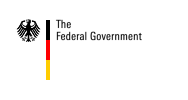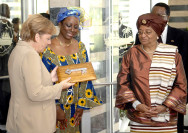"I can assure you that the fate of your country and its reconstruction are close to our hearts," said Merkel after a meeting with the Liberian President in Monrovia. Germany is extremely interested in seeing Liberia recover economically, she continued.
The Chancellor announced that Germany will do everything it can to achieve the cancellation of Liberia's international debt. A number of hurdles must be taken though within the International Monetary Fund.
Reconstruction in the wake of the civil war
During their visit, the Chancellor and the Federal Minister for Economic Cooperation and Development, Heidemarie Wieczorek-Zeul, promised another four million euros support for this year in the form of reconstruction aid. This brings German assistance to a total of 18.4 million euros. As a present for their hostess, as it were, the German government promised 300,000 modern mosquito nets to help in the fight against malaria.
A local project assisted by the German government involves revitalising the country's cacao industry. The public-private partnership project is to secure the livelihood of around 10,000 cacao farmers.
Adopting the EU's Africa strategy
Within the European Union too, Merkel will be doing her best to ensure that the devastated country is given a chance to put in place operational infrastructure. Liberia must be able to market its products and make use of its wealth within a fair trading system.
In this context the Chancellor once again emphasised the importance of the EU-Africa summit meeting in December, the first to be held for seven years. At this meeting, the EU will be elaborating a new EU-Africa strategy along with the African states.
"We want to talk to all African states, said Merkel, "and where criticism is called for it will be forthcoming," she added referring to the possible attendance by President Robert Mugabe of Zimbabwe.
Speaking to the African Union a few days earlier, Merkel had already expressed her concern about the situation in Zimbabwe, where the opposition is being threatened, intimidated and harassed. Mugabe's regime has been destroying slum areas and is guilty of consistent human rights violations. We must not simply stand by and watch these developments, urged Merkel.
On-the-spot assistance
After her meeting with the Liberian President, the Chancellor visited a refugee project being implemented by the Deutsche Gesellschaft für Technische Zusammenarbeit (GTZ), German Technical Cooperation, and the UN High Commissioner for Refugees (UNHCR). Many thousand refugees are still living under extremely difficult conditions in neighbouring countries. Along with UNHCR, the GTZ is helping returnees find their feet again. They are learning, for instance, to forge tools out of weapons.
>> GTZ in Liberia
The civil war has also left emotional and psychological scars. Two of every three Liberian women were victims of rape during the bloody conflicts. Johnson-Sirleaf has announced "zero tolerance" for violence against women. But here too, she must first bring about a change in awareness, for instance in the training of police officers and judges. The Chancellor visited the National Policy Academy, where the UN is helping train police officers, to gain an impression of the work in this field.
From 1989 to 2003 Liberia was in the clutches of civil war. In 2003 the warlord and President, Charles Taylor, left the country and went into exile. The subsequent United Nations Mission in Liberia (UNMIL) is responsible for security in the country until constitutional order has been restored. Since the mission was launched, some 14,000 international troops and police officers have been deployed in the West African state, most of them provided by other African countries. UN police instructors (UNPol) are currently training more than 3,500 Liberian men and women as police officers. The UN peacekeepers are also to disarm rebels and help refugees return to their home regions. Germany has been supporting the mission since 2005 with a team from the Federal Agency for Technical Relief (THW) and five police officers.
>> Homepage of UNMIL
Africa remains on the agenda
From the African Union to the visit to the continent's economic powerhouse South Africa, and on to Liberia, the Federal Minister for Economic Cooperation and Development believes that her African trip with the Chancellor has sent out an important signal. "It shows that Africa remains firmly on the agenda of the international community, " stated Heidemarie Wieczorek-Zeul resolutely.
"We will honour the pledges made at the G8 summit in Heiligendamm, she continued. It is in our very own best interests to do so. Reconstruction and prevention work in Africa is, in the final analysis, "security policy for us too".

